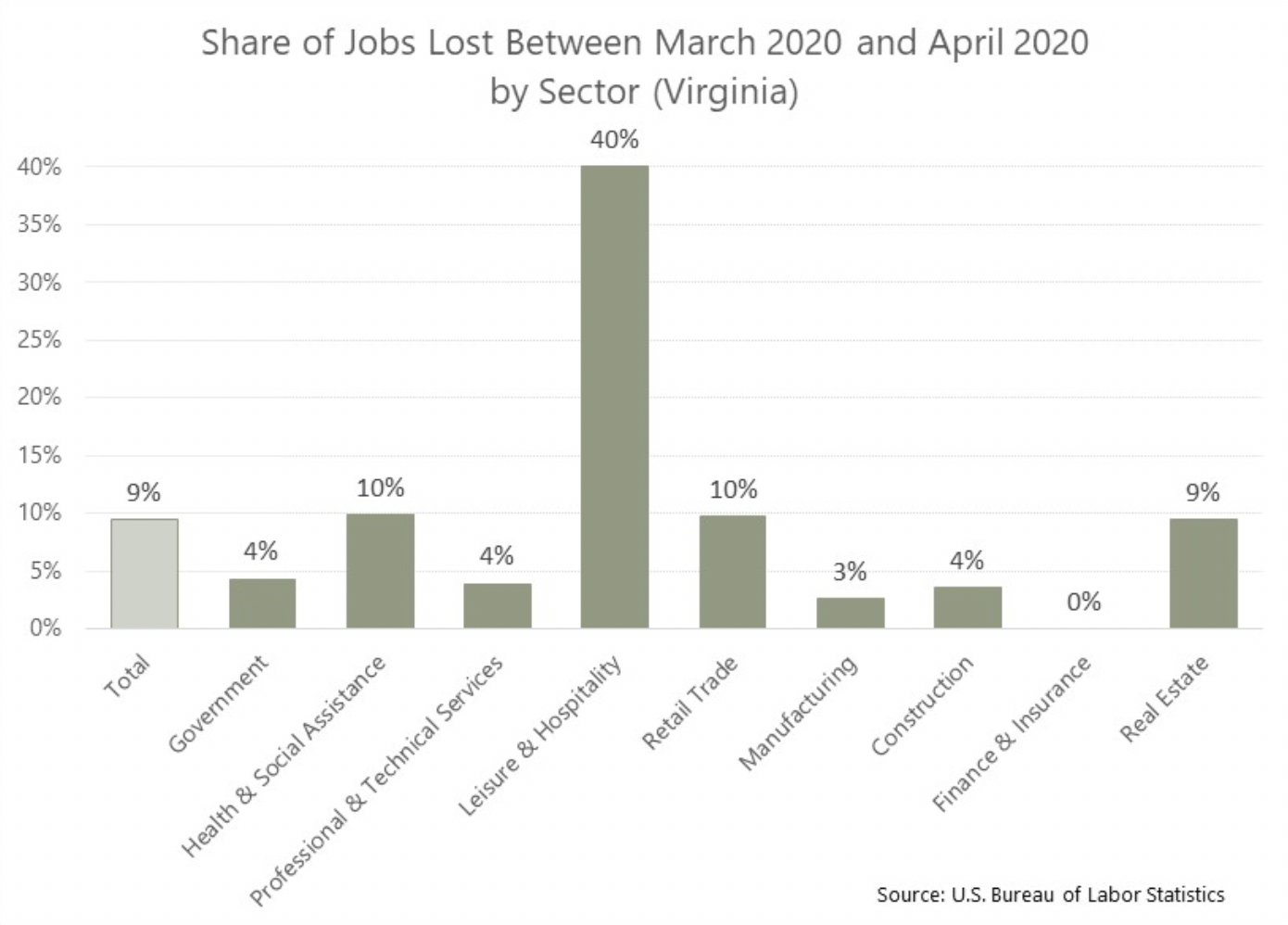What Types of Jobs Are We Losing Amid COVID-19?
June 2, 2020
Between March and April 2020, the Commonwealth of Virginia lost 383,400 jobs, which amounts to 9% of the total employment in the state. The current job losses far outpace the losses experienced during the Great Recession, during which Virginia’s economy lost an estimated 130,000 jobs in total over an 18-month period.
Unlike the last recession, where job losses were widespread over many sectors of the economy, the current job losses are highly concentrated in a few industries that have been the most adversely impacted by the public health crisis that led to the Governor’s stay-at-home directive and other executive orders limiting activities.
The industry that has been hardest hit—by far—is the Leisure & Hospitality sector. Between March and April 2020, that sector lost 40% of its jobs. These losses include workers in restaurants and bars, as well as workers in travel, tourism, entertainment, and recreation jobs.
10% of all jobs in the Health Care & Social Assistance sector were lost between March and April. While the demand for some types of health care services have increased dramatically during the COVID-19 pandemic, many health care professionals, such as dentists, physical therapists, and doctors performing non-essential health procedures, have had to shutter their offices during March and April.
The Retail Trade sector also declined, as many stores closed or saw significantly less foot traffic during COVID-19. Between March and April 2020, 10% of all retail jobs—including retail salespeople and store managers—were lost.

Other parts of the economy have been relatively less impacted by job losses this spring. The Professional & Technical services sector, which includes many office workers who were able to work remotely during COVID-19, experienced a 4% drop in jobs between March and April. The Government sector also shed 4% of its job base between March and April. Manufacturing, which is another key sector of Virginia’s economy, has also been relatively resilient during the COVID-19 outbreak, with a loss of just 3% of all manufacturing jobs between March and April.
The real estate and construction industries have also been impacted by the downturn, but the job losses have not been as severe as in some other sectors. For example, the Construction industry in Virginia shed 4% of its jobs between March and April. The Finance & Insurance sector, which includes mortgage lenders, bankers, and insurance agents, actually saw a small uptick in jobs between March and April, which reflects the demand for home refinance loans, as well as applications for business loans (e.g., the Payment Protection Program loans) and claims for insurance coverage.
An estimated 5,500 real estate jobs were lost between March and April 2020, which is about 9% of the total number of real estate jobs in Virginia. In this data, the Real Estate sector includes real estate agents and brokers who are employees of organizations, and also includes appraisers, property managers and leasing consultants. This data does not include most self-employed workers, and we know that a significant number of the state’s unemployment claims were from self-employed people, independent contractors, and “gig” workers who filed for Pandemic Unemployment Assistance (PUA).
Beginning in June, we expect to see a turnaround in Virginia’s economy, with furloughed workers being called back to work and employers posting help wanted ads. It will take some time to recover some of the job losses, particularly in the Leisure & Hospitality sector, but employment in some other key sectors should recover more quickly. Real estate professionals that had looser ties to the industry may not return in full force, but as the housing market improves, the real estate sector will also rebound strongly in the months ahead.
You might also like…
5 Key Takeaways from the NAHREP 2023 State of Hispanic Homeownership Report
By Sejal Naik - April 17, 2024
In March 2024, the National Association of Hispanic Real Estate Professionals (NAHREP) released its 2023 State of Hispanic Homeownership Report. Using data from surveys conducted by various public… Read More
3 Multifamily Market Trends from the First Quarter
By Dominique Fair - April 16, 2024
For the last three years, the multifamily market has seen high demand, double digit rent growth, and increased construction to meet demand. These trends are expected to shift… Read More
Virginia’s Housing Market Sees Largest Influx of New Listings Since 2021
By Robin Spensieri - March 29, 2024
According to the February 2024 Virginia Home Sales Report released by Virginia REALTORS®, pace in Virginia’s housing market picked up last month. There were 6,733 homes sold statewide in February,… Read More